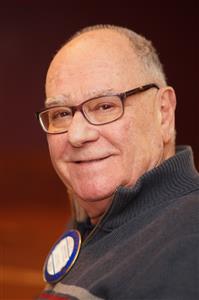Time Out for Tony
With rituals completed, twelve Barre Rotarians and three guests helped ourselves to a buffet of chicken, potatoes, veggies and brownies. As usual, Tony was first on his feet with a Happy Dollar in celebration of his daughter’s upcoming marriage. After a long story surrounding the preparations, he added another dollar for some unknown reason. John proposed a fine on Tony for taking too much time. Tony had no defense. Fine passed. Tony then threw in another dollar followed by naming the groom and extolling his virtues. Doug gave a Happy Dollar because Bon Air, Virginia “dodged a bullet” regarding hurricane Florence. Scott gave a Happy Dollar in noting that Tony doesn’t have any more time.
Secretary’s Report
Sue asked Barre Rotarians to introduce our guests: Dick introduced his nephew, Joe Shadroui; John introduced Bob Houle; and Doug Bullett introduced himself. Sue also announced the Joe Shadroui had applied for membership and that Loren Polk has been accepted as a member.
Parental Pride Motivates Happy Giving
Caroline announced that money from the breakfast continues to come in. Eddie gave two Happy Dollars: one for the family golf tournament and one for the Red Sox winning their divisional title for the 3rd straight year. Sue added to the coffers in recognition of her son’s interview highlighting his service as a singer and pianist at St. Monica’s. Keeping the musical theme going, John gave a Happy Dollar because his daughter, a flutist, had an audition in Middlebury with one of the best teachers in Vermont and was accepted as student. Both expressed their pride as parents.
The Funk Report
Scott gave a brief report on the District Leadership Rotary Leadership Institute held last weekend. He pointed out that one comes away with a great many ideas from others in attendance. For example, one club sets up tables at a regular meeting and members conduct committee work without having to schedule additional time or commit to an evening. One focus of discussion was the Rotary Foundation and the various projects it sponsors around the world. He also said that there was a $5000 teacher scholarship for continuing education intended to enable teachers to study a topic anywhere in the world.
Building Flourishing Communities
Acting President Caroline introduced our speakers for the day: Dave Sanguinetti and Priscilla White. They are two of twenty-three Master Trainers spreading awareness about how adversity in childhood can lead to lifelong health and wellness consequences. Neuroscience and the science of resilience now show us the effects of toxic stress and how important prevention is, both to stop the loss of human potential and to lower the costs of health care, education and prisons. The opening slide of their PowerPoint presentation introduced us to the cluster of associated sciences called N.E.A.R. Science: Neuroscience, Epigenetics, Adverse Childhood Events (ACEs) and the science of Resiliency. Dan began with the results of the Kaiser Permanente Study conducted by the Centers for Disease Control & Prevention with over 17,000 participants. The Adverse Childhood Experience (ACE) Study confirms, with scientific evidence, that adversity early in life increases physical, mental and behavioral problems later in life. Common adverse childhood experiences include: household dysfunction (substance abuse, divorce, mental illness, battered mothers and criminal behavior); neglect (emotional and physical); abuse (emotional physical and sexual). He explained that an ACE score can be calculated by adding up how many adverse experiences an individual had in childhood. This score reliably predicts challenges during the course of life. The higher the score the more likely an individual will have problems in adulthood. Examples of ACE attributable problems include: alcoholism and alcohol abuse; coronary heart disease, liver disease, mental problems, violence, drug abuse, obesity, and workplace problems.
Priscilla talked about how early childhood experiences affect brain development and adult functioning comparing the perceived environment and adaptation. If the childhood experience is perceived as dangerous, then the adaptation is fight, flight, freeze and adult functioning is survive worst conditions. If the childhood experience is perceived as safe, then adaptation is people, process and possibility and adult functioning is survive best conditions-vulnerable in worst. She pointed out that when a child is under stress, the reaction comes from the reptilian part of the brain and not the cerebral cortex and thus, talking logically to the child is a waste of time. She suggested asking the child when would be a good time to talk: now, in an hour or a day from now. She also spoke about core protective systems: capabilities, attachment and belonging and community, culture and spirituality. She quoted Ann Masten (2009): “Nurturing the healthy development of these protective systems affords the most important preparation or ‘inoculation’ for overcoming potential threats and adversities in human development. Similarly, damage or destruction of these systems has dire consequences for the positive adaptive capacity of individuals.” Priscilla concluded the presentation with “CHANGE is up to US: It is shaped by our thoughts, our conversations, the way we relate with one another in relationships, in families and in communities. Building Flourishing Communities is spreading the information about how to help our children grow up with strong, addiction-resistant brains, the ability to build meaningful relationships, focus on their work and remain calm under stress.”
Dan and Priscilla’s presentation was complemented with anecdotes, graphic and stimulating slides and with appreciation from the audience were delivered a warm round of applause. For more information contact: Priscilla.White@vermont.gov.
